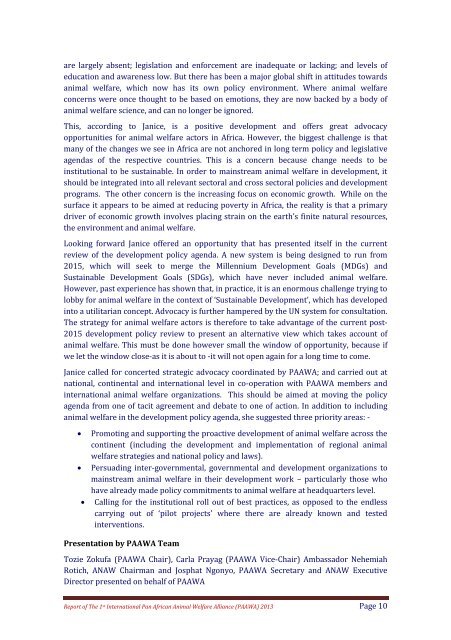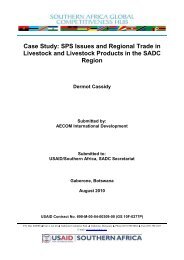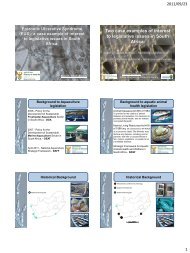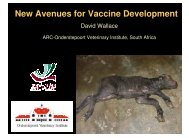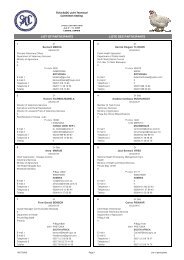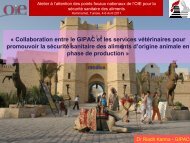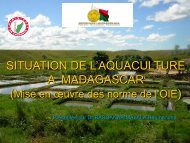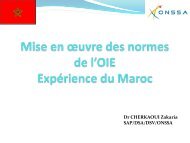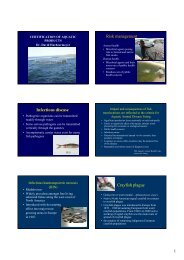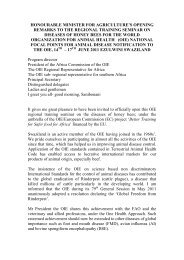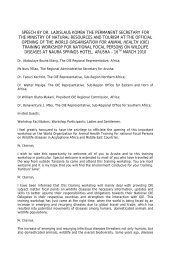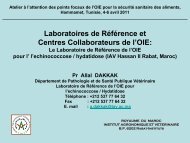1st INTERNATIONAL PAN AFRICAN ANIMAL WELFARE ALLIANCE ...
1st INTERNATIONAL PAN AFRICAN ANIMAL WELFARE ALLIANCE ...
1st INTERNATIONAL PAN AFRICAN ANIMAL WELFARE ALLIANCE ...
You also want an ePaper? Increase the reach of your titles
YUMPU automatically turns print PDFs into web optimized ePapers that Google loves.
are largely absent; legislation and enforcement are inadequate or lacking; and levels ofeducation and awareness low. But there has been a major global shift in attitudes towardsanimal welfare, which now has its own policy environment. Where animal welfareconcerns were once thought to be based on emotions, they are now backed by a body ofanimal welfare science, and can no longer be ignored.This, according to Janice, is a positive development and offers great advocacyopportunities for animal welfare actors in Africa. However, the biggest challenge is thatmany of the changes we see in Africa are not anchored in long term policy and legislativeagendas of the respective countries. This is a concern because change needs to beinstitutional to be sustainable. In order to mainstream animal welfare in development, itshould be integrated into all relevant sectoral and cross sectoral policies and developmentprograms. The other concern is the increasing focus on economic growth. While on thesurface it appears to be aimed at reducing poverty in Africa, the reality is that a primarydriver of economic growth involves placing strain on the earth’s finite natural resources,the environment and animal welfare.Looking forward Janice offered an opportunity that has presented itself in the currentreview of the development policy agenda. A new system is being designed to run from2015, which will seek to merge the Millennium Development Goals (MDGs) andSustainable Development Goals (SDGs), which have never included animal welfare.However, past experience has shown that, in practice, it is an enormous challenge trying tolobby for animal welfare in the context of ‘Sustainable Development’, which has developedinto a utilitarian concept. Advocacy is further hampered by the UN system for consultation.The strategy for animal welfare actors is therefore to take advantage of the current post-2015 development policy review to present an alternative view which takes account ofanimal welfare. This must be done however small the window of opportunity, because ifwe let the window close-as it is about to -it will not open again for a long time to come.Janice called for concerted strategic advocacy coordinated by PAAWA; and carried out atnational, continental and international level in co-operation with PAAWA members andinternational animal welfare organizations. This should be aimed at moving the policyagenda from one of tacit agreement and debate to one of action. In addition to includinganimal welfare in the development policy agenda, she suggested three priority areas: -Promoting and supporting the proactive development of animal welfare across thecontinent (including the development and implementation of regional animalwelfare strategies and national policy and laws).Persuading inter-governmental, governmental and development organizations tomainstream animal welfare in their development work – particularly those whohave already made policy commitments to animal welfare at headquarters level.Calling for the institutional roll out of best practices, as opposed to the endlesscarrying out of ‘pilot projects’ where there are already known and testedinterventions.Presentation by PAAWA TeamTozie Zokufa (PAAWA Chair), Carla Prayag (PAAWA Vice-Chair) Ambassador NehemiahRotich, ANAW Chairman and Josphat Ngonyo, PAAWA Secretary and ANAW ExecutiveDirector presented on behalf of PAAWAReport of The 1 st International Pan African Animal Welfare Alliance (PAAWA) 2013 Page 10


